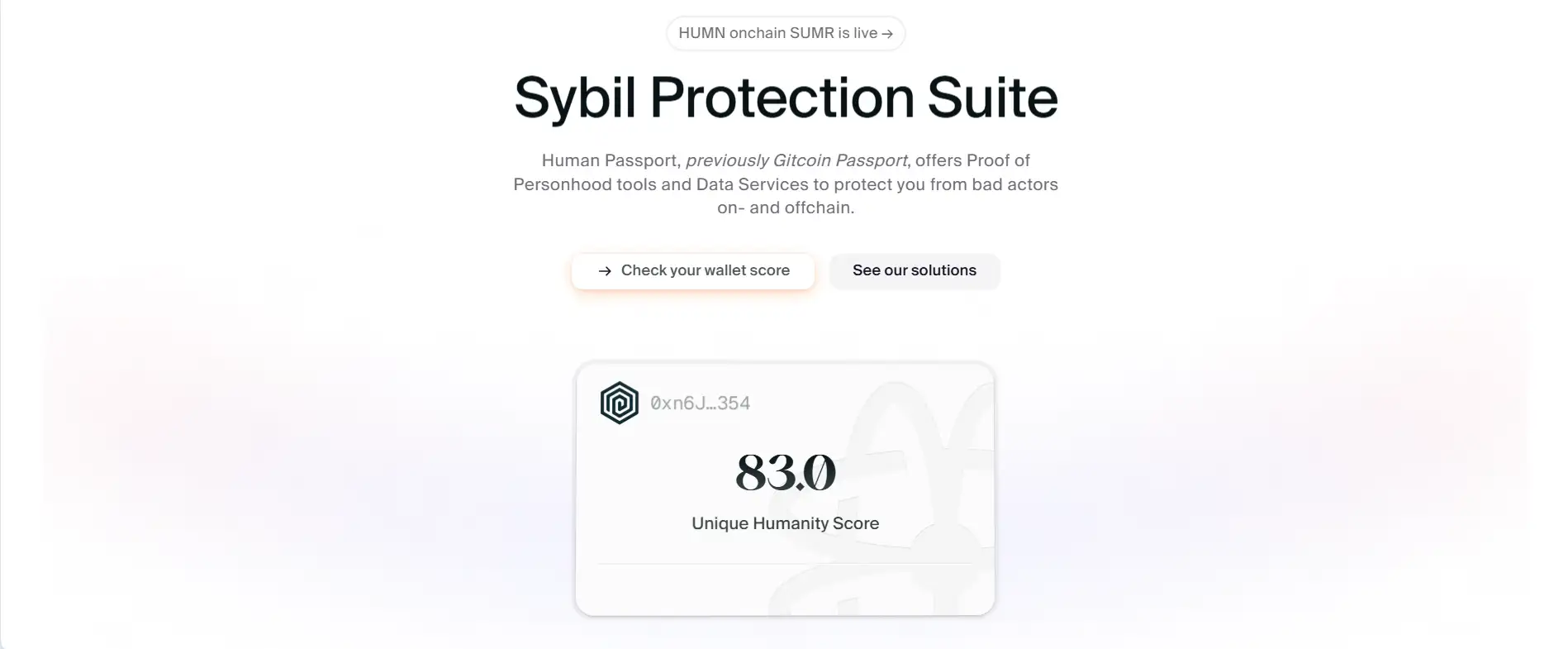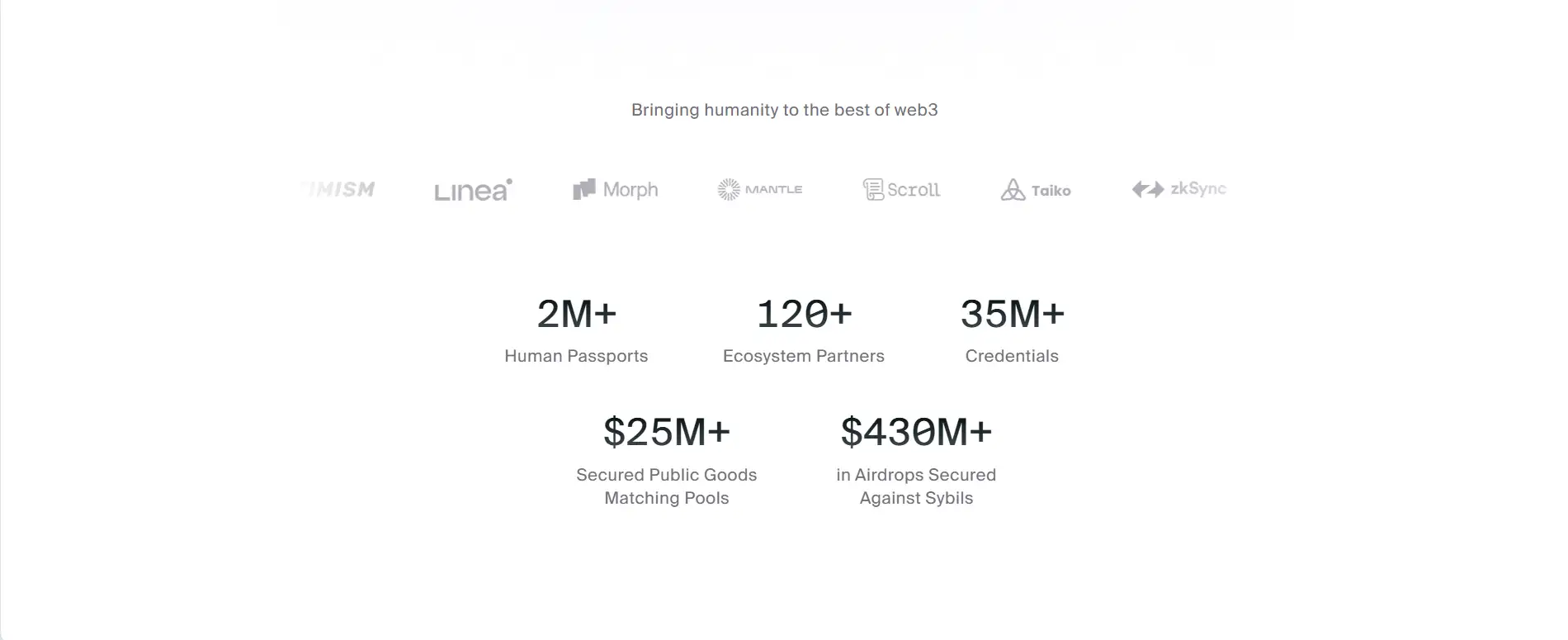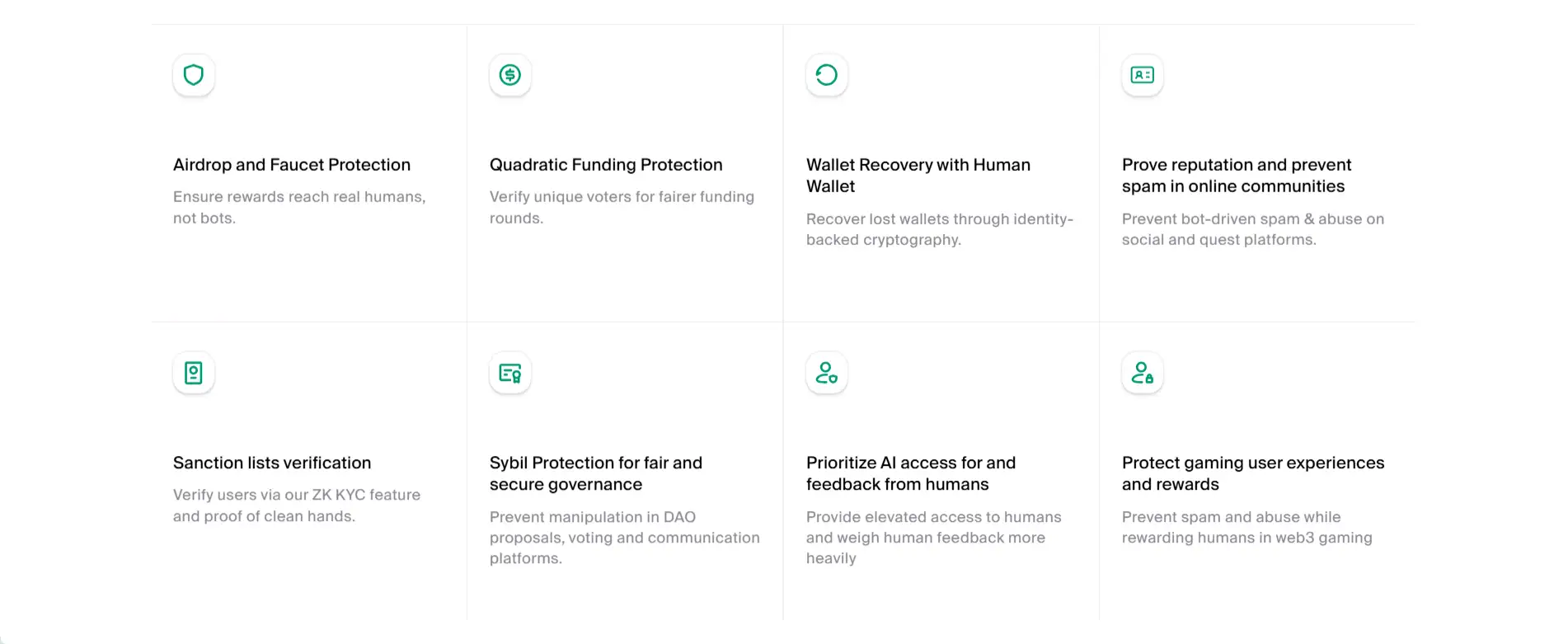About Human Passport
Human Passport is a powerful identity verification application and Sybil resistance protocol designed to bring verified humanity into the heart of Web3. Originally launched as Gitcoin Passport, it has evolved into a broader and more robust identity layer, now operating under Human Passport and part of the human.tech ecosystem. The platform empowers developers, projects, and communities with tools to confirm real human users, protect against bots, and ensure fairness across governance, rewards, and online engagement.
By aggregating identity credentials from multiple sources like BrightID, Gitcoin, Civic, and Coinbase, Human Passport allows users to build a dynamic, verifiable identity. These credentials form the basis of a user’s Unique Humanity Score, which applications can use to gate access to voting, airdrops, quests, and more. From Sybil protection to real-time verification and decentralized wallet recovery, Human Passport represents a future-proof approach to identity in the decentralized world.
Human Passport is a modular and developer-friendly Sybil resistance solution built to solve one of the biggest challenges in Web3: proving that someone is a real, unique human without compromising their privacy. The platform is the spiritual successor to Gitcoin Passport, initially developed to defend Gitcoin Grants from Sybil attacks. As the need for fair governance, airdrops, and onchain participation grew across the ecosystem, the team saw an opportunity to transform Passport into a standalone, community-driven infrastructure for the broader decentralized world.
The technology stack behind Human Passport includes integrations with Ceramic Network for data storage, a system of modular "Passport Stamps" for identity attestation, and a highly customizable Unique Humanity Score. Users can earn these Stamps from trusted identity providers—ranging from KYC systems to proof-of-participation tools like POAPs and ENS. This composability enables rich, reputation-backed profiles without relying on invasive identity checks.
Key integrations include projects such as Gitcoin, Galxe, Snapshot, and Guild, all of which leverage Human Passport to secure governance, protect reward distribution, or enable gated access. Developers and organizations can also use Human Passport's Data Services to analyze wallet histories, identify Sybil patterns, and implement proactive security across multiple EVM chains.
One of the most compelling aspects of the platform is its emphasis on real-time Sybil protection. Via API access, developers can plug into the system and instantly determine whether a wallet belongs to a human or a Sybil attacker. The protocol’s behavioral clustering, onchain analytics, and multi-source credentialing ensure higher signal and lower noise—an essential combination in a world where bots dominate incentive programs and DAO votes.
The Human Passport protocol addresses several use cases, including but not limited to: airdrop protection, DAO governance, marketplace quality assurance, faucet security, and spam prevention in online communities. Beyond Sybil defense, the system also facilitates trust-building in decentralized environments by allowing users to showcase verified credentials and prove their reputation. This is especially useful in reputation-driven spaces like community forums, grant programs, and content curation platforms.
Unlike traditional Web2 identity systems, Human Passport is fully decentralized, privacy-first, and user-controlled. It offers seamless composability for developers, whether they want to gate access to events, prevent airdrop abuse, or ensure that governance votes reflect the voices of real humans. With ongoing support from human.tech and adoption by over 100 Web3 projects, Human Passport is paving the way for an identity layer that’s both secure and sovereign.
Human Passport provides a range of features and benefits that help developers and communities stay Sybil-resistant, privacy-compliant, and truly human-centric:
- Modular Identity Verification: Choose from a wide range of verifiable credentials—KYC, biometrics, wallet activity, web of trust—to build dynamic, user-controlled profiles.
- Unique Humanity Score: Evaluate users based on their accumulated verified Stamps from trusted identity providers to enable fair participation in governance and rewards.
- Real-Time Sybil Protection: Use API endpoints to instantly validate users across wallets and block Sybil accounts from gaming your system.
- Data Services & Clustering: Gain insight into wallet behavior and onchain activity patterns with machine learning models and analyst-supported reporting.
- API-First Infrastructure: Easily integrate identity protection into your app with a few lines of code. Supports EVM chains and real-time feedback.
- Secure Wallet Recovery: Use identity-backed cryptography to recover lost wallets with Human Wallet—safe, private, and user-friendly.
- Composability with Web3 Tools: Works seamlessly with tools like POAP, ENS, and BrightID.
- Privacy by Design: Users stay in control of their data, and no centralized identity databases are created—everything is decentralized and cryptographically secured.
Getting started with Human Passport is simple and designed for seamless integration:
- Step 1 – Visit the Platform: Go to the official Human Passport site to explore the available tools and services.
- Step 2 – Create a Human Passport: Click “Create Passport” and connect your wallet to begin building your verified identity using trusted credentials.
- Step 3 – Collect Stamps: Add identity Stamps from services like Gitcoin, BrightID, Civic, and more. The more trusted credentials you add, the higher your Unique Humanity Score.
- Step 4 – Explore Integrations: Use your Passport on supported apps like Snapshot, Galxe, and Gitcoin.
- Step 5 – Access Developer Docs: Developers can use the Human Passport API documentation to add real-time Sybil resistance to any app.
- Step 6 – Use Data Services: Submit wallet lists for Sybil detection and receive insights on user authenticity with clustering and wallet analysis.
- Step 7 – Join the Community: Stay connected through the newsletter or reach out on Telegram to collaborate and explore unique identity use cases.
Human Passport FAQ
Human Passport assigns each user a Unique Humanity Score based on verified credentials called Passport Stamps. These Stamps are issued by trusted identity providers such as BrightID, Gitcoin, Coinbase, and more. Each stamp contributes to your score depending on its credibility, recency, and diversity. This modular approach allows users to build their identity organically and privately across Web2 and Web3 sources. You can view and manage your score directly on Human Passport.
Yes. Human Passport supports identity-based wallet recovery through a system called Human Wallet. By linking verified identity Stamps to your wallet, you can use cryptographic proofs to recover access without relying on seed phrases. This is especially useful for users who lose access to devices or private keys. It offers a secure and decentralized way to regain control while avoiding traditional custodial solutions. Learn more on Human Passport.
Human Passport protects DAO governance platforms by ensuring that only real, verified humans can vote or submit proposals. It integrates with governance tools like Snapshot to gate participation based on Humanity Scores. This prevents bots or multi-wallet actors from gaining disproportionate influence, ensuring that governance reflects real community sentiment. The result is fairer, more transparent voting in decentralized ecosystems.
Human Passport provides powerful Data Services for developers and ecosystem managers. These include multi-chain Sybil detection, behavioral wallet clustering, and real-time classification. Developers can submit wallet lists for analysis and receive detailed reports showing which addresses are likely Sybil actors versus real users. These tools enable projects to optimize community engagement, improve airdrop targeting, and prevent abuse across campaigns.
Absolutely. Human Passport is designed to be modular and privacy-first. Users can build their identity profile using non-KYC credentials such as participation badges, wallet activity, POAPs, and social trust systems like BrightID. While KYC is an option, it is not required. This ensures that users maintain sovereignty over their digital identity while still participating in Sybil-resistant applications.
You Might Also Like












